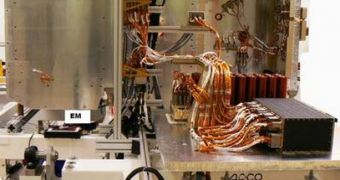Officials at the European Space Agency (ESA) announce that the Engineering Model of the Galileo In-Orbit Verification (IOV) satellites has just finished undergoing a preliminary battery of tests. The investigations were mostly designed to discover any potential major flaw with the design. The four planned IOV vehicles will form a primary constellation of satellites that will precede the Galileo satellite navigation system. This will be the European Union first worldwide system, and is meant to be an alternative to the US-built Global Positioning System (GPS). China and the Russian Federation are also currently working on similar initiatives.
According to ESA, the Engineering Model has completed “several phases of testing in cooperation with the ground segment, and is now being prepared for electromagnetic compatibility testing. The second in a series of System Validation Tests (SVT-0B1) has been executed from the Galileo Launch and Early Orbit Phase Operations Control Center at CNES in Toulouse, France. A number of important tests were performed on the platform subsystems, including Attitude and Orbit Control System mode transitions, power subsystem and transponder functional tests and onboard computer tests.”
The IOV stage of Galileo is of the utmost importance for the success of the entire network. The four satellites that will make up this early array will have a design and functionality that will be very similar to those of the first Full Operational Capability (FOC) Galileo spacecrafts, and will be used to test a variety of parameters before actual launches begin. At this point, the first pair of IOV satellites is scheduled to be launched around April 2011, but no firm date has yet been established. The definition, and development stages of Galileo, as well as its IOV phase, is being funded jointly by ESA and the European Community.
After IOV concludes, the actual construction of Galileo will begin. A number of 14 Full Operational Capability (FOC) satellites have already been ordered and contracted, with many more on their way if all goes according to plan. At this time, engineers at Rome, Italy-based Thales Alenia Space are working on the integration procedure for the Engineering Model. The equipment will be affixed to its chassis, which also includes avionics controls, a propulsion system, and solar panels for producing electrical energy.

 14 DAY TRIAL //
14 DAY TRIAL //